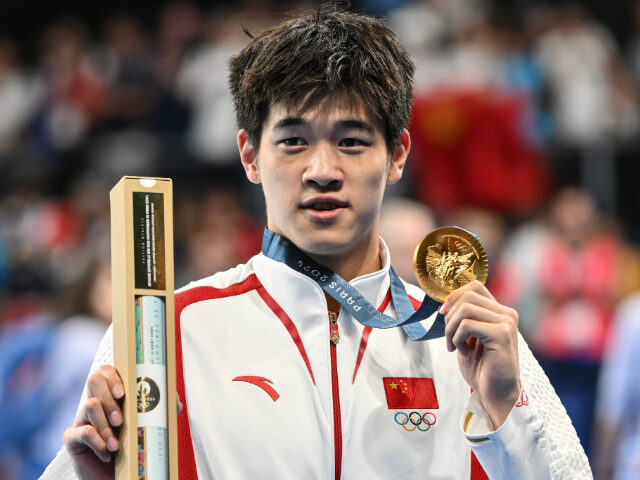China’s state-run Global Times complained Thursday that Olympic doping tests are a form of “psychological” warfare against the nation’s athletes, and a Chinese athlete winning a gold medal after enduring “an unprecedented number of anti-doping tests” should rebut the “U.S. doping slander” against the Chinese team.
“Analysts said on Thursday that in the face of an improving Chinese swimming team, the U.S., which had dominated the event, has used political tricks to put pressure on Chinese athletes,” the Global Times raved, repeating the same baseless speculation at the end of its editorial. “But the acts harmed its own national image, and it is hard not to doubt whether in four years’ time in Los Angeles, the U.S. will be able to conduct the games fairly and uphold the Olympic spirit.”
The Chinese doping controversy that had the Global Times hyperventilating into a paper bag is very real, contrary to the communist newspaper’s hysterics about “slander.” China’s swim team was embroiled in a massive doping scandal in the 2021 Tokyo Olympics, and 11 of the swimmers who tested positive for drugs are competing at the 2024 Paris Games.
On Tuesday, the New York Times reported that two Chinese swimmers who tested positive in 2022 for a banned anabolic steroid were “secretly cleared of doping late last year by Chinese authorities.”
Chinese officials have a habit of claiming their athletes test positive for drugs after eating tainted food, an excuse that was once again trotted out for the latest scandal. This time, the athletes under suspicion supposedly got banned substances in their bloodstream by eating hamburgers in Beijing.
The New York Times noted that international anti-doping agencies have questioned that explanation, but the Chinese athletes were nevertheless allowed into the Paris Olympics, which angered a couple of officials enough to turn them into whistleblowers:
Investigators and at least one expert for the World Anti-Doping Agency, known as WADA, were not convinced of the contamination explanation in the most recent case, one of the people with knowledge of the matter said. But the agency — which is supposed to serve as a backstop when a country’s own antidoping authorities fail to properly police its athletes — chose not to appeal China’s decision not to impose bans on the swimmers.
Another antidoping agency, the International Testing Agency, which was created in the wake of the Russian doping scandal that rocked Olympic sports nearly a decade ago, also reviewed the case. At least one I.T.A. official believed that swimming’s global governing body should appeal the Chinese decision to clear the athletes, the people with knowledge of the case said. But the swimming organization, known as World Aquatics, did not do so.
The two people with direct knowledge of the positive tests spoke on the condition of anonymity because details about the tests are supposed to remain secret. They said they decided to disclose the information because they believe that the tests were covered up and that the world should know about them at a time when global antidoping efforts are coming under intensified scrutiny.
The Global Times naturally accepted the word of CHINADA, the China Anti-Doping Agency, without question when it insisted the athletes were drug-free. The World Anti-Doping Agency (WADA) said it was “greatly concerned about a number of cases” but could not find enough evidence to challenge CHINADA’s conclusions. The general attitude among international agencies appeared to be a deep reluctance to challenge the conclusions of national health authorities.
The New York Times noted that some banned substances do seem to be “ingested accidentally,” sometimes under strange and complex scenarios, so the threshold for disproving accidental contamination scenarios can be rather high. On the other hand, China has never provided much evidence for its accidental contamination theories.
The American vector of this controversy, which dove the Global Times into a lather, is that the U.S. Department of Justice (DOJ) and FBI are running a criminal investigation into the handling of the 23 positive tests from the Tokyo Olympics. The International Olympic Committee (IOC) and WADA evidently view this investigation as an attempt to undermine their international system and are threatening reprisals against the Olympic games to be held in the United States.
“The New York Times‘ insistence on politicizing the doping issue … is aimed at disrupting the order of the Paris Olympics swimming competition and undermining the psychological state and competitive ability of Chinese athletes,” CHINADA complained after the Tuesday piece was published.
“This is extremely unfair and immoral,” CHINADA said. Unmoved by the Chinese complaint, the New York Times stood by its reporting.
Chinese swimmer Pan Zhanle won China’s first swimming gold medal on Wednesday, an achievement the Global Times portrayed as “a powerful rebuttal to the doubts that have overshadowed the Chinese swimming team” because Pan passed 29 drug tests in 2023.
The Global Times complained that Chinese swimmers are tested “almost four times” as often as most American athletes.
The U.S. Anti-Doping Agency (USADA) shot back that China only gets to complain about the testing schedule of American athletes because those tests are conducted transparently, and the results are made public, while China has a history of sweeping drug tests “under the carpet.”
USADA further pointed out that when American sprinter Erriyon Knighton claimed he ingested a banned substance through contaminated meat, he was able to prove the specific meal he ate was tainted with a steroid rather than making “a general claim of contamination.”

COMMENTS
Please let us know if you're having issues with commenting.